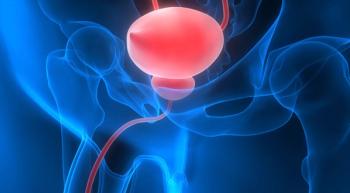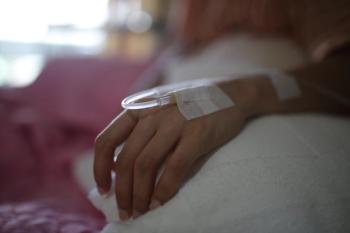
Bladder Cancer
Latest News
Latest Videos

More News

Patients who received systemic therapy at the end of life did not have longer overall survival averages than those who did not receive therapy at end of life.

Antibody-drug conjugates represent a paradigm shift for patients with cancer and providers.

Padcev and Keytruda improve survival and progression among patients with bladder cancer, but don’t adversely impact pain, functioning or quality of life.

For patients with cisplatin-ineligible bladder cancer, presurgical Padcev decreased the cancer stage without leading to delays in surgery.

The FDA has approved several treatments for patients with solid tumors. Here are five recently approved treatments.

A novel delivery system of gemcitabine called TAR-200 led to promising responses in certain patients with non-muscle-invasive bladder cancer.

The Food and Drug Administration granted a Biologics License Application for subcutaneous Opdivo for potential approval.

A urine test was shown to decrease the need for invasive cystoscopies in patients with non-muscle-invasive bladder cancer.

Before patients receive Enhertu for HER2-positive solid tumors, it’s important to know about the potential side effects.

Treatment with Enhertu “is an unprecedented approval” for patients with HER2-positive solid tumors who did not have many options, an expert told CURE®.

A treatment combination of Anktiva and Bacillus Calmette-Guérin was approved by the FDA for certain patients with non-muscle-invasive bladder cancer.

The survival benefit observed with Padcev plus Keytruda was “unlike anything we’d seen before” for advanced bladder cancer, according to an expert.

Since January 2024, the Food and Drug Administration has approved several treatments and combinations for solid tumors.

Treatment with immune checkpoint inhibitors has improved survival outcomes for patients with metastatic bladder cancer, compared with chemotherapy.

Quality of life, sexual outcomes and self-image should be considered before choosing a treatment option for muscle-invasive bladder cancer, an expert said.

Olivia Munn Discusses Breast Cancer, Christine Brinkley Diagnosed With Basal Cell Carcinoma and More
From Oliva Munn and Christine Brinkley discussing their cancer to Donnie Iris returning to the stage after his experience with the disease, here is what’s happening in the oncology space this week.

The Food and Drug Administration (FDA) has approved Opdivo (nivolumab) in combination with cisplatin and gemcitabine for the first-line treatment of adults with unresectable or metastatic bladder cancer, the agency has announced.

A phase 2 trial showed that Trodelvy plus Keytruda had a high response rate with lasting responses, emphasizing “potential additive or synergistic effects,” an expert said.

Anktiva boosted responses to BCG treatment without affecting quality of life, research showed.

Treatment for muscle-invasive bladder cancer called dose-dense MVAC did not improve survival compared with chemotherapy alone, although one drug in the combination faces a shortage.

There are a few conversations patients should have with their care teams after being diagnosed with bladder cancer — especially as new treatments become more available.

I had a friend who was diagnosed with the same bladder cancer as me, though our experiences were extremely different.

Some patients with metastatic bladder cancer and FGFR3 genetic alterations may benefit from Balversa, as it “represents a critical need,” an expert said.

Here are some of the top stories from the recent Gastrointestinal Cancers Symposium as well as the Genitourinary Cancers Symposium.

The Food and Drug Administration will speed up their review of Enhertu for previously treated patients with certain HER2-positive solid tumors.














